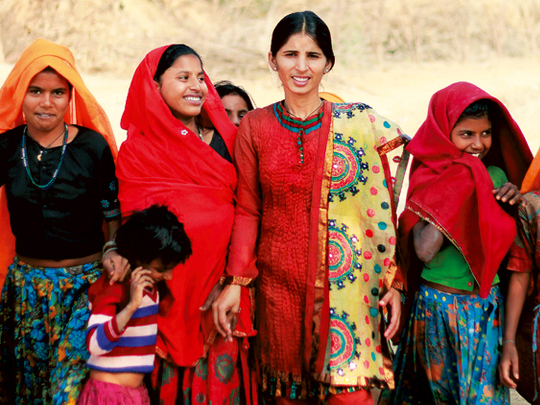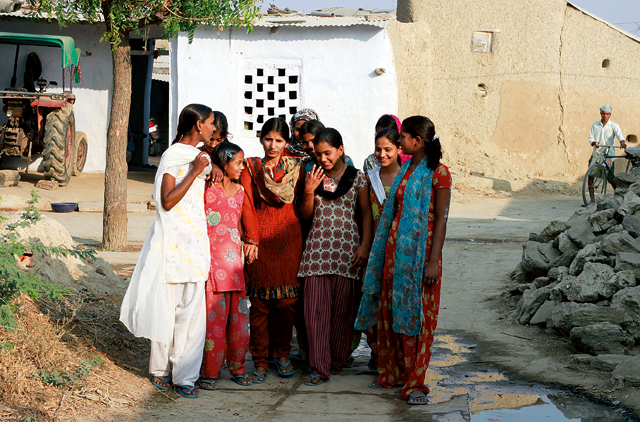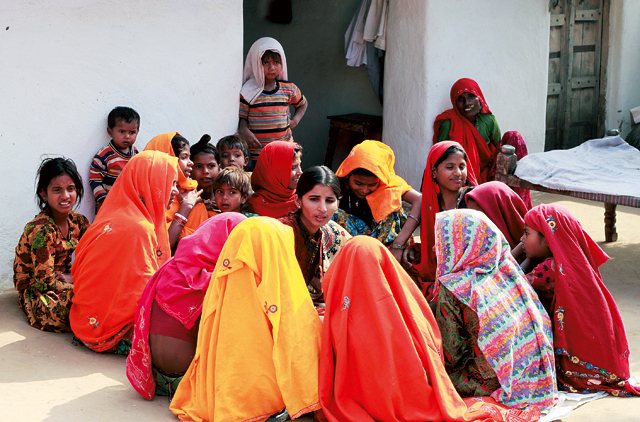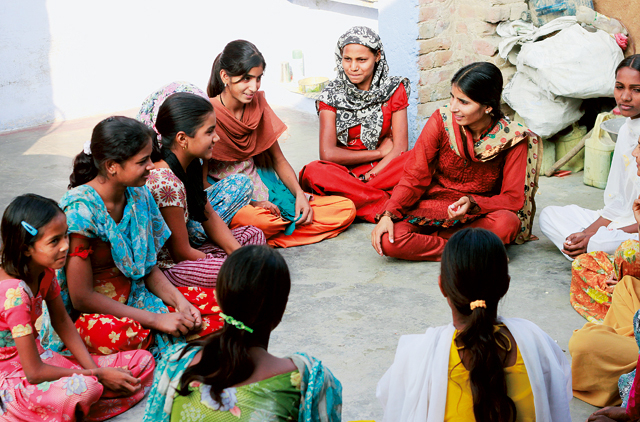
A line of young innocent girls stand on her doorstep, begging and pleading for help. The youngest is just ten, the oldest barely 14 and they have no one to turn to but Vijaylaxmi Sharma. The girls will soon be married off to much older men by their parents, but these girls are desperate to escape their fate.
Vijaylaxmi, 24, knows only too well the tears they've shed. She too was in their position when her parents wanted her to quit school and marry at 13. But she rebelled against her family and tradition - and won.
She ushers the girls inside, determined to stop them from becoming child brides. "I wanted to help every single one of the young girls in my village and beyond," says Vijaylaxmi. "They were all being ill-treated and were led to believe in the tradition of underage marriage. But I made it my job to teach every girl and her parents in my area that change is possible and we don't have to follow tradition any longer. There doesn't need to be child marriages in the modern day."
Vijaylaxmi, now a teacher, from Paghi village in Rajasthan, India, had the same dreams and hopes as any other girl when she was 13. She wanted to learn, play with her friends and get good grades in school so she could get a good job. But her mother Kamala Devi, 39, a housewife, and father Sharvan Lai, 52, a farmer, tried to force her to quit school, learn to run a household and marry a man who is 15 years older than her.
According to Unicef, 47 per cent of women in India in 2009 - the latest available figures - were married before the legal age of 18. In some rural Indian communities, that figure reached 56 per cent.
Unicef has found that 40 per cent of child marriages around the world occur in India. Families in rural areas are poor and often believe that having a daughter is a disadvantage, as girls have little hope of finding a job and becoming financially independent. Desperate to alleviate the burden on their family, handing over their little girl in exchange for payment from a groom or his family is their only option.
"My parents were following tradition," Vijaylaxmi says. "Like so many other families, they had no idea of the consequences of what they were doing or if it was wrong. They were uneducated and couldn't think on their own. They just believed that marrying me to a man at 13 was good for my future and respectful in our community. They knew nothing else."
But Vijaylaxmi had other ideas. She had no intentions of marrying and starting a family so young. She had dreams of finishing school and building a career as a teacher.
"I don't know where I got my strength from to refuse to marry," she says. "There was just something inside me that didn't want the life my friends had. I watched one of my school friends marry at 13, get pregnant at 14 and die while giving birth. It was a tradition that was a nightmare and I didn't want it for me."
A period of struggle
"It was so hard to make my parents see my way," she adds. "I had a tough fight on my hands to change their minds. At first they punished me for being rebellious and they locked me up in a room for two days with no food or water. They hoped I'd come out at the end and do as they said. But that just made me even more determined."
Months passed and the family fights continued, but Vijaylaxmi stuck to her beliefs. While other girls in her village married and became pregnant, Vijaylaxmi and her family were ridiculed. It was against local custom not to marry at a young age, and the family fell victim to spiteful gossip. "At times I wondered if what I was doing was right. I was putting my family through so much," she admits.
"I had a daily argument with myself, between my own beliefs and my love for my family. But I couldn't betray myself and my life. I knew I was worth much more," she says.
"People would mock my father for having an unmarried daughter. They'd write awful things about me on walls near my house and no one would talk to me. But I begged my parents to see my view. ‘I won't let you down,' I told them. ‘I will marry one day, just not yet, let me live a little,'" she says.
Then one day, a neighbour came knocking on Vijaylaxmi's door. Her daughter had died during childbirth. She was just 14 years old.
"Don't force your daughter to marry," she begged Vijaylaxmi's mother, Kamala. "I've lost my daughter, I wish I could turn back the clock and do things differently."
Another mother told them how her daughter had just become a widow at 14 and local tradition meant she could never marry again. Her life was over before it had even begun. Slowly Kamala began to change her mind.
"My mother is a good person and eventually, because she trusted me, she believed in what I was saying," she says. "Thankfully she saw my way of thinking in the end. Meanwhile I was getting top grades at school, and my head teacher paid my parents a visit telling them of my achievements. It was a huge help. They could see how serious I was about my education and getting a career."
Soon, word spread. Other girls in Vijaylaxmi's school and village heard about her courage to stand up against tradition.
"I had spent months and years watching girls my age marry, then all of a sudden things began to change," she explains. "There were young girls who also believed in waiting to marry and they were knocking on my door asking me to speak to their parents. I'd been through so much and eventually persuaded my family I'd made the right decision. So I agreed to try. I don't know where my confidence came from."
The girls' parents listened, and more young girls started turning up on Vijaylaxmi's doorstep, looking for help. With each passing month Vijaylaxmi heard about another marriage being planned, and with her two brothers Mahesh and Vijay Kumar for protection, she'd visit the family and speak to the parents in private and dissuade them from forcing their daughter into becoming a child bride. "It was hard at first because I was wondering what exactly I was doing," she says. "Who was I to tell these people to change? But then I remembered how I felt when I thought my parents were going to force me to marry. I was doing it for the girls who hadn't found their voice yet."
Vijaylaxmi described her own situation to every parent she could and explained how she persuaded her parents to change their thinking. She convinced many parents in her village to let their daughters get an education, build life experiences and marry later.
"I came across a lot of stubborn parents," she says, "but eventually they'd listen. I explained that there are other options, made them understand the possibilities. Most families are illiterate so they don't know any other life. All they need is some guidance and inspiration.''
The more marriages she stopped and the more girls she saved from marriage, the more friends she made. Over time, a group of courageous girls joined Vijaylaxmi to help change their community. With her neighbours, Priyank, 16; Seema, 16; Sunita, 14, and 12 other teenagers who wanted to help, Vijaylaxmi created an informal group. If any of the girls heard about a marriage being organised they'd tell Vijaylaxmi and it became a team effort to try and convince the parents to let the girl wait.
"Soon, we were meeting once a month," Vijaylaxmi says. "The girls would tell me what they'd heard and then we'd go knocking on doors." With a lot of persistence, the girls managed to stop all the child marriages that they heard about. "I was so proud that I'd helped these young girls in my community have a chance at life and following their dreams rather than becoming child brides," she says.
Realising a brighter future
Vijaylaxmi finished school with top marks and landed a job as a teacher. She now works in a secondary school and advises all her students that they have more to offer than just marrying young. "I want to educate all my students and help the girls realise they too have a future and can marry happily once they turn 21," she says.
"Recently I persuaded a 25-year-old mother, Channa, to stop the wedding of her ten-month-old daughter, Kiran. She would have been paid a small fortune for marrying her daughter off, but I managed to make her see sense," Vijaylaxmi says. "They're so uneducated that they don't know any other life. They think they're doing their daughter a good service. But I make them see that they're not."
Now Vijaylaxmi plans to travel across India, educating families about child marriages.
"My mother was 13 when she married. She thought I'd marry at that age too. She knew nothing else. But now it's different. I've shown people it can be different, they just need to see there's another way."
Her mother, Kamala, still regrets her attempts to force Vijaylaxmi to marry. "I look back on what I put her through and it brings tears to my eyes," she admits. "I was also 13 when I married and I've had a happy life, I didn't realise I was doing anything wrong. But I thank my daughter for changing me, for giving me knowledge. I am so proud of her, I wish I had three of her. She is my everything."
Vijaylaxmi is now ready to marry and is looking for a potential husband. But she is thankful that at 24 she can marry when she chooses and not when tradition dictates.














